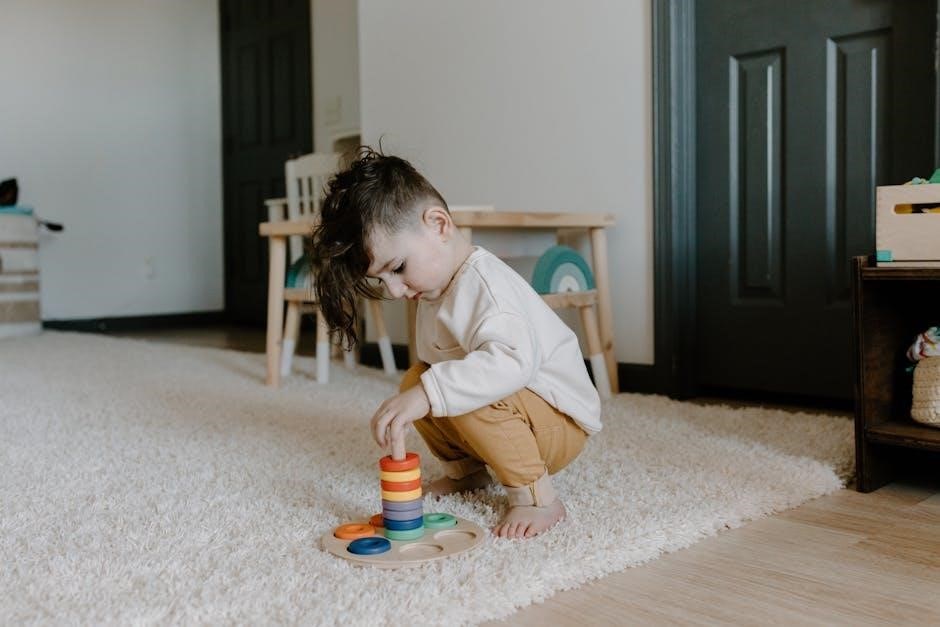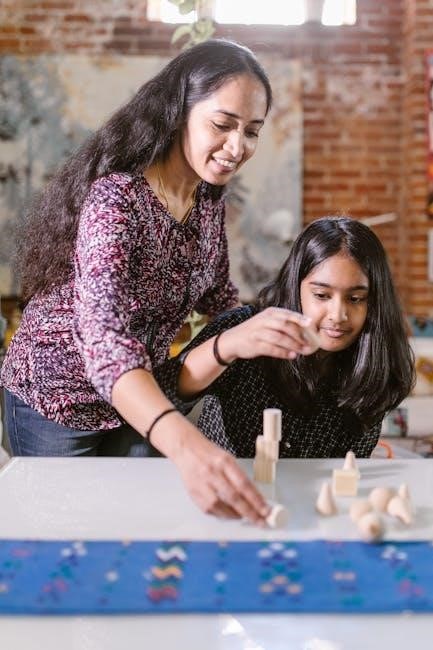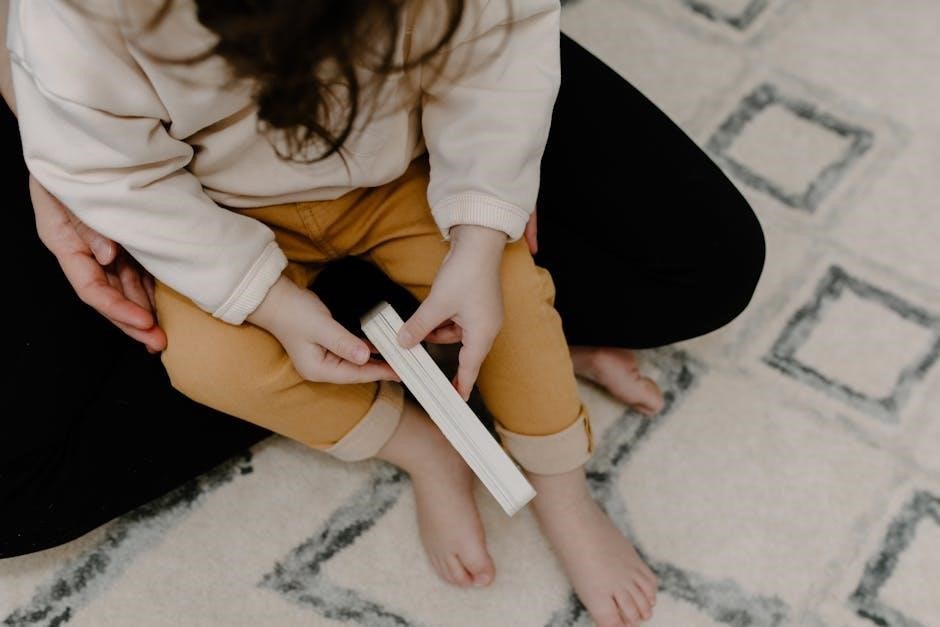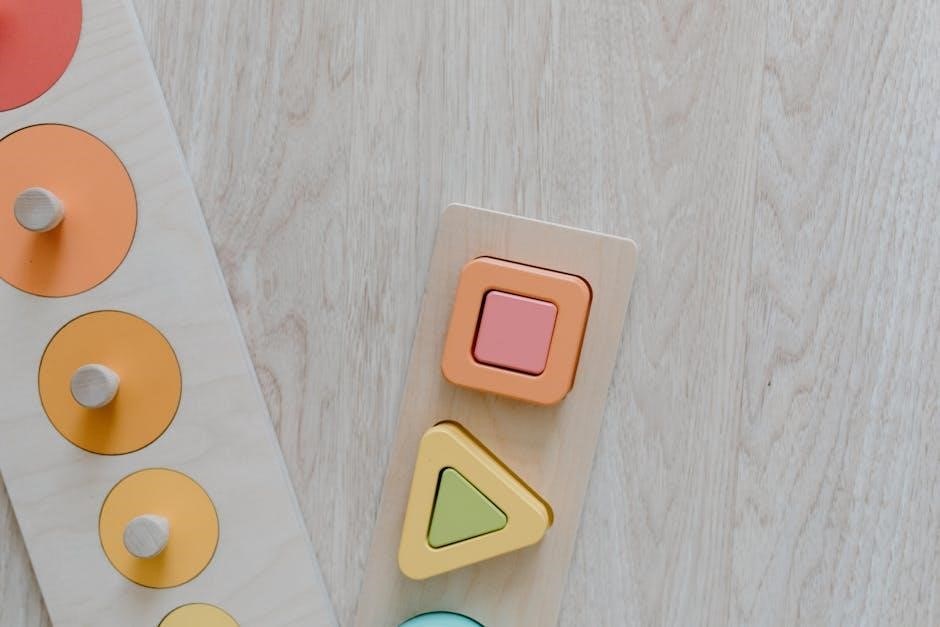Developed by Dr. Maria Montessori, this child-centered approach emphasizes self-directed learning, hands-on activities, and collaborative play. It fosters independence, curiosity, and a deep love for learning in a prepared environment.

Overview of the Montessori Syllabus
The Montessori syllabus is a child-centered educational framework designed to foster independence, critical thinking, and a love for learning. It integrates various subjects, including Mathematics, Language, Science, and Cultural Education, through hands-on activities and discovery-based learning. The curriculum is structured to meet the developmental needs of children at different stages, from preschool to elementary levels. It emphasizes practical life skills, sensory development, and social-emotional growth, preparing children for lifelong learning. The syllabus is flexible, allowing teachers to adapt to individual learning styles and pacing. By focusing on holistic development, the Montessori approach aims to nurture confident, curious, and compassionate individuals. This integrated and dynamic curriculum is widely recognized for its effectiveness in fostering academic and personal growth.

Subject-wise Breakdown
The Montessori syllabus encompasses Mathematics, Language, Science, Geography, and Practical Life Skills, with a focus on hands-on learning and interdisciplinary connections, fostering holistic child development.
Mathematics Curriculum
The Montessori Mathematics Curriculum is designed to help children develop a deep understanding of numerical concepts through hands-on materials and activities. It begins with concrete representations, such as number rods and bead frames, to introduce basic concepts like sequencing, place value, and arithmetic operations. As students progress, they transition to more abstract materials, fostering logical thinking and problem-solving skills. The curriculum emphasizes practical application, allowing children to explore mathematical relationships and patterns at their own pace. This approach cultivates a strong foundation in numeracy, preparing students for advanced mathematical reasoning. Assessment is ongoing, with teachers observing progress and providing individualized support to ensure mastery of concepts. The goal is to inspire a lifelong appreciation for mathematics and its role in everyday life.
Language and Literacy
The Montessori Language and Literacy curriculum is structured to nurture children’s communication skills through hands-on activities and individualized instruction. It begins with phonetic awareness, using materials like sandpaper letters and moveable alphabets to introduce sounds and letter formation. As children progress, they explore word building, reading, and writing, fostering a natural progression from concrete to abstract learning. The curriculum emphasizes vocabulary development, comprehension, and creative expression, encouraging children to engage with literature and composition. Practical applications, such as labeling objects and writing stories, reinforce language skills in a meaningful way. The prepared environment and trained teachers support each child’s unique pace, ensuring a strong foundation in literacy. This approach aims to cultivate not only proficiency but also a lifelong love for language and communication.
Cultural Education
Cultural education in the Montessori syllabus is designed to broaden children’s understanding of the world and foster global awareness. It integrates subjects like geography, history, and science, encouraging children to explore cultural diversity. Hands-on materials, such as globes and timelines, help children visualize and connect with different regions and historical events. The curriculum emphasizes practical life skills, including care of the environment and community involvement, to promote empathy and responsibility. Children engage in activities that celebrate various cultures, traditions, and festivals, fostering respect and appreciation for human diversity. This holistic approach ensures that cultural education is not only academic but also experiential, preparing children to become compassionate and informed global citizens. The Montessori method encourages children to see themselves as part of a larger, interconnected world, fostering a sense of unity and shared humanity.
Science and Geography
The Montessori syllabus integrates science and geography to foster curiosity about the natural world and its interconnected systems. Hands-on materials, such as maps, globes, and science experiments, encourage children to explore and understand their environment. The curriculum emphasizes experiential learning, allowing children to discover scientific concepts through observation and experimentation. Geography lessons focus on cultural awareness, introducing children to diverse regions, traditions, and ecosystems. Science activities, such as studying plants, animals, and the human body, promote critical thinking and problem-solving skills. The Montessori approach encourages children to see themselves as stewards of the Earth, fostering a sense of responsibility and respect for the environment. By integrating science and geography, the syllabus prepares children to navigate and appreciate the complexities of the world around them, laying a foundation for lifelong learning and exploration.
Practical Life Skills
Practical Life Skills are a cornerstone of the Montessori syllabus, designed to help children develop independence and self-care abilities. These activities include everyday tasks such as pouring, sorting, cleaning, and preparing simple meals. By engaging in these exercises, children refine their fine motor skills, hand-eye coordination, and attention to detail. The activities are presented in a structured, sequential manner, allowing children to master each step at their own pace. Practical Life Skills also foster a sense of responsibility and self-confidence, as children learn to care for themselves, others, and their environment. These skills are foundational for future independence and are integrated into the broader Montessori curriculum to promote holistic development. Through these exercises, children build a strong work ethic and a deeper understanding of the importance of contributing to their community.

Implementation of the Syllabus
Implementation of the Montessori syllabus requires trained educators and a prepared environment. Teachers undergo specialized training in child development and the Montessori philosophy to create a supportive learning space effectively.
Teacher Training
Teacher training is a cornerstone of the Montessori method. Educators undergo specialized programs to understand child development, the Montessori philosophy, and the use of materials. These programs equip teachers with the skills to create a supportive learning environment. They learn to observe children, guide them without interference, and foster independence. The training also emphasizes the importance of a prepared environment and how to tailor activities to individual needs. Teachers are trained to encourage curiosity, critical thinking, and self-directed learning. This comprehensive approach ensures that educators are well-prepared to implement the Montessori syllabus effectively, helping children reach their full potential. The training is ongoing, with teachers continually updating their knowledge to align with the evolving needs of students and the Montessori framework.
The Prepared Environment
The prepared environment is a cornerstone of the Montessori method, designed to promote independence, exploration, and self-directed learning. It is thoughtfully curated to meet the developmental needs of children, with materials and activities tailored to their age and abilities. The environment is organized to encourage movement, choice, and concentration, fostering a sense of order and respect for the space. Specialized Montessori materials are arranged to allow children to explore concepts at their own pace, from practical life skills to academic subjects. The prepared environment also emphasizes accessibility, with materials placed at the child’s level and arranged to facilitate independent use. This intentional design creates a space where children can thrive, building confidence and a love for learning. The environment is continually adapted to reflect the evolving needs of the students, ensuring it remains a nurturing and stimulating space for growth.

Assessment Methods
In the Montessori approach, assessment is a holistic and ongoing process focused on observing and supporting each child’s unique development. Teachers use careful observation to track progress, noting developmental milestones and individual achievements. Unlike traditional testing, Montessori assessments emphasize qualitative feedback, often recorded in detailed portfolios. These portfolios include work samples, teacher observations, and self-assessment tools, providing a comprehensive view of a child’s growth. The goal is to identify strengths, areas for improvement, and learning styles, ensuring personalized instruction. Peer and self-assessment are also encouraged, fostering self-awareness and responsibility. Progress is shared with parents through regular meetings, creating a collaborative approach to education. This method prioritizes understanding and growth over grades, aligning with the Montessori philosophy of nurturing the whole child.

Skills Developed
Montessori education fosters problem-solving, critical thinking, and self-directed learning. It encourages independence, collaboration, and creativity, preparing children to be adaptable and confident lifelong learners. This approach nurtures the whole child, promoting emotional and intellectual growth.
Problem-Solving Skills
The Montessori syllabus emphasizes the development of problem-solving skills through hands-on, self-directed activities. Children engage in practical exercises that encourage logical thinking and creativity. By exploring materials like math manipulatives, students learn to break down complex problems into manageable steps. This approach fosters independence and builds confidence, equipping children to tackle challenges with resilience. The curriculum also integrates real-world scenarios, helping students apply their skills in meaningful ways. Collaborative activities further enhance their ability to think critically and work effectively in groups. The focus on discovery and experimentation cultivates a mindset that values trial and error, preparing students to navigate an ever-changing world with adaptability and innovation. Through this method, Montessori education empowers children to become resourceful and analytical thinkers. These skills are foundational for lifelong learning and personal growth.
Independence
Independence is a cornerstone of the Montessori syllabus, fostering self-reliance and personal responsibility in children. The prepared environment is designed to encourage children to explore and learn at their own pace, making decisions about their activities and managing their time effectively; Practical life skills, such as caring for themselves and their surroundings, further cultivate independence by teaching children to perform tasks confidently without adult intervention. Montessori materials are specifically designed to promote self-directed learning, allowing children to work independently and take pride in their accomplishments. This approach not only builds confidence but also helps children develop a sense of ownership over their learning process. By fostering independence, the Montessori method prepares children to become self-motivated individuals capable of navigating challenges in all areas of life. This foundation of autonomy is a key aspect of the Montessori philosophy.

Community Involvement
Community involvement is a vital component of the Montessori syllabus, fostering a sense of social responsibility and connection. Children are encouraged to engage with their local communities through events, service projects, and cultural activities. This involvement helps children develop empathy, understanding, and a sense of belonging. Montessori schools often partner with local organizations to provide opportunities for students to contribute meaningfully, such as participating in clean-up initiatives, food drives, or cultural celebrations. These experiences not only enrich the children’s learning but also instill a sense of duty toward society. By integrating community involvement into the curriculum, Montessori education prepares students to become compassionate and active participants in their communities, aligning with the philosophy’s emphasis on holistic development and global citizenship.
The Montessori syllabus offers a transformative approach to education, focusing on child-centered learning, hands-on activities, and holistic development. By fostering independence, critical thinking, and a love for learning, it equips children with essential life skills. The curriculum’s emphasis on a prepared environment, specialized materials, and trained educators ensures a nurturing and effective learning process. Community involvement further enriches the Montessori experience, cultivating empathy and social responsibility. As a result, Montessori education continues to be a preferred choice for families worldwide, providing a strong foundation for future success and a lifelong commitment to personal growth and development.
